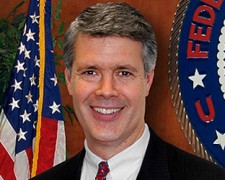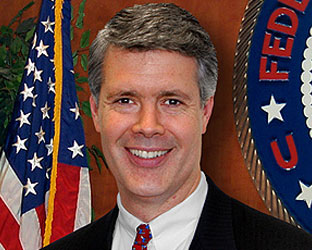 During a hearing on the FCC budget held by the Subcommittee on Financial Services and General Government, FCC Commissioner Robert McDowell broached the topic of putting TV political advertising files online, and noted that while transparency was a laudable goal, there are a lot more issues involved, not the least of which is loading broadcasters with up to $140K in annual compliance costs.
During a hearing on the FCC budget held by the Subcommittee on Financial Services and General Government, FCC Commissioner Robert McDowell broached the topic of putting TV political advertising files online, and noted that while transparency was a laudable goal, there are a lot more issues involved, not the least of which is loading broadcasters with up to $140K in annual compliance costs.
McDowell also addressed spectrum auctions, saying he would do his best to keep the rules governing the process as minimal and “future-proof as possible.”
But he went on at length about the political file issue. Here’s what he had to say in his written testimony.
“Within the next few months, the Commission may vote on a proposal to place the political advertisement portion of television broadcasters’ public inspection files on a government-hosted website. Transparency is a laudable public policy goal, especially in the context of political spending. Furthermore, providing broadcasters with more cost-effective means to comply with FCC rules is also a noble endeavor. Congress should be aware, however, that this particular issue brings with it many factual, legal and pragmatic complexities that are not obvious at first glance.
“By way of background, Commission rules require the public inspection file to contain a series of documents, including information regarding broadcasters’ programming of local interest, hiring practices, correspondence from the public and the political file. Since 1965, broadcasters have kept these paper files at the relevant station under the mandate that they be available for inspection by any member of the public upon reasonable request. The contents of the public file generally speak to whether a broadcaster is serving its community of license properly. The Commission voted to require online posting of most portions of broadcasters’ general public inspection files in 2007, but exempted political files from the requirements because the burdens outweighed the benefits.
“The political file contains information for candidates seeking to purchase political ads and sheds light on the spending patterns of campaigns, political committees, third-party groups and such. Unlike other parts of the public inspection file, the contents of the political file do not speak to whether a broadcaster is serving its local community of license. The political file is a tool for examining transparency in campaign spending rather than broadcaster behavior. Although Section 315 of the Act has mandated that broadcasters keep a political file since 2002, Congress should be aware that this requirement seems to be experiencing “mission creep” at the FCC.
“In October 2011, the Commission proposed to reverse its 2007 position regarding political file mandates with little to no evidence that candidates, their representatives, or members of the local communities served by broadcasters have been unable to access the required information, let alone that the benefits would outweigh the costs.5 In fact, the evidentiary record before the Commission illustrates that the proposed new rules could cost the TV broadcast industry $15 million in upfront expenses to scan existing paper files and upload them to a new government website while also forcing each station to incur upwards of $140,000 per year in recurring costs to maintain the information in real-time, or “immediately,” as the FCC has proposed. The record also shows that these new federally-mandated costs on businesses would likely be offset by cuts to local programming and newsgathering. Not only would such a rule be especially onerous for smaller and independent broadcasters in these challenging economic times, but it could also undermine long-standing federal policy to promote local programming.
“Furthermore, the proposed rules would require broadcasters to reveal proprietary and competitively sensitive advertising and rate information online. While the original goal of such disclosure may have been to create more transparency in the political spending process, the unintended consequence could be to encourage price signaling and other anti-competitive conduct by broadcasters that could produce harmful market distortions.
“Before venturing further down this regulatory road, policy makers should be thoughtful and deliberative when examining the implications and nuances that could arise as a result of their potential actions. I still see many unanswered questions:
“* If the public policy goal of new rules is to produce more transparency in campaign spending, is the FCC the best agency to achieve such ends?
“* As a threshold matter, does the FCC possess the legal authority to require these political advertising disclosures be posted online?
“* Didn’t Congress intend through the Bipartisan Campaign Reform Act of 2002 for the expert agency on campaign finance disclosure matters, the Federal Election Commission (FEC), to be in charge of implementing campaign finance disclosure requirements?
“* If so, would FCC requirements that are duplicative to FEC rules violate the Paperwork Reduction Act? • In the wake of the Supreme Court’s decision in the Citizens United case, is it not the role of the legislative branch to debate and craft new laws in the campaign finance arena that would focus on the entities spending the money rather than having an agency, which has no expertise in campaign finance, regulate in this area?
“* Where are the equities in singling out only television broadcasters for such disclosure requirements when political campaigns spend money on a plethora of outlets to contact and influence voters including, but certainly not limited to, advertising expenditures on: radio, newspapers, the Internet, direct mail, outdoor ads, cable television, satellite radio and TV, paid activists to knock on doors, and many, many more avenues for voter outreach?
“Furthermore, the Supreme Court reiterated in its Citizens United decision that political speech is core protected speech under the First Amendment; therefore, as a threshold matter, the government’s ability to regulate in this area is severely curtailed.
“As a consequence, administrative agencies and Congress alike should think carefully before imposing new laws and regulations that could be construed by the Court as de facto, or “backdoor,” inhibitions on political speech.
“I am hopeful that we as policy makers can comply with all relevant laws while finding the right balance between protecting core political speech and encouraging transparency without disproportionately burdening one of many outlets.”
RBR-TVBR observation: We are particularly pleased to see that McDowell questioned a protocol that demands full disclosure from television broadcasters but allows all other media to operate behind a shroud of secrecy.
Not only is that unfair to voters seeking to learn about election spending, it unfairly provides sensitive pricing information to television’s fiercest competitors. Even if you think the people behind the ads should be identified, it is crazy to force only television broadcasters to divulge this information.





